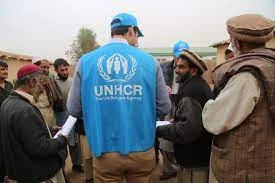The Taliban warned the United States not to "destabilise" the regime during their first face-to-face talks since the US withdrawal, its foreign minister Amir Khan Muttaqi said on Saturday.
"We clearly told them that trying to destabilise the government in Afghanistan is good for no one," Muttaqi told the Afghan state news agency Bakhtar after talks in Doha.
"Good relations with Afghanistan are good for everyone. Nothing should be done to weaken the existing government in Afghanistan which can lead to problems for the people," he said, in a recorded statement translated by AFP.
Muttaqi's remarks came on the first of two days of talks with a US team led by the State Department's Deputy Special Representative Tom West and top USAID humanitarian official Sarah Charles.
No immediate comment was available from the US side.
The Taliban regained power in August as the United States ended its 20-year occupation with a withdrawal that included a chaotic airlift of foreign residents and Afghans.
Taliban representatives asked the United States to lift a ban on Afghan central bank reserves at a meeting with US counterparts in Doha, Afghanistan's acting foreign minister said on Saturday in remarks reported by Qatar-based Al-Jazeera television.
The minister, Amir Khan Muttaqi, also said Washington would offer Afghans coronavirus vaccines, Al-Jazeera reported, after the first senior face-to-face meeting between the two sides since the Taliban group took over the country in August following a US troop pullout.
The minister added that the Afghan delegation and US counterparts discussed "opening a new page" between the two countries, adversaries during the United States' two-decade long occupation of Afghanistan.Washington and other Western countries are grappling with difficult choices as a severe humanitarian crisis looms large over Afghanistan. They are trying to formulate how to engage with the Taliban without granting it the legitimacy it seeks while ensuring humanitarian aid flows into the country.
The departure of US-led forces and many international donors robbed the country of grants that financed 75% of public spending, according to the World Bank.
Speaking to Reuters earlier in Washington, a US official said that while there was an improvement for humanitarian actors to get access to some areas that they haven't been to in a decade, problems still persisted, adding that the US delegation at the Doha talks would press the Taliban to improve
Mutaki also said that the Afghan delegation focus at the meeting was humanitarian aid and implementing Doha agreement.
He said the discussions would continue on Saturday and would resume on Sunday. Mutaki added the Afghan delegation will meet European Union representatives to discuss latest developments, but he didn't mention when the meeting will be held.
The world should urgently provide promised aid to Afghanistan, the UN refugee agency said on Saturday, warning that a lack of resources is hampering efforts to avert an economic crisis that could push fresh flows of refugees to its neighbours and beyond.
"The humanitarian crisis in Afghanistan remains really dire," Babar Baloch, spokesperson for the UN High Commmissioner for Refugees, said in an interview in Islamabad.
"The focus has to be inside Afghanistan to avoid and avert another refugee crisis."
Since the Taliban took over Afghanistan on August 15, the country - already struggling with drought and severe poverty from decades of war - has seen its economy all but collapse
Most of the nation's international assistance has been cut off, though there are exceptions for humanitarian aid. Billions of dollars in central bank assets held abroad have also been frozen, which has put pressure on the banking system.
"Our worry is Afghan suffering will increase, the impact will be inside but also it could be beyond Afghanistan in terms of displacement not only to countries like Pakistan and Iran that have been generous hosts of refugees for decades, but beyond."
The total needed for humanitarian operations in Afghanistan in the next few months is $600 million, Baloch said, and only 35% of that had been provided by international donors, despite promises at a recent conference in Geneva where donors pledged more than $1 billion in aid
"Those pledges have to turn into reality, the cash has to be there for us to step in and support...Afghans," he said.
Baloch added there were new challenges since the collapse of the government and the takeover of the country by the Taliban administration. The lack of commercial flights meant supplies needed to be taken in on special flights or by road.



